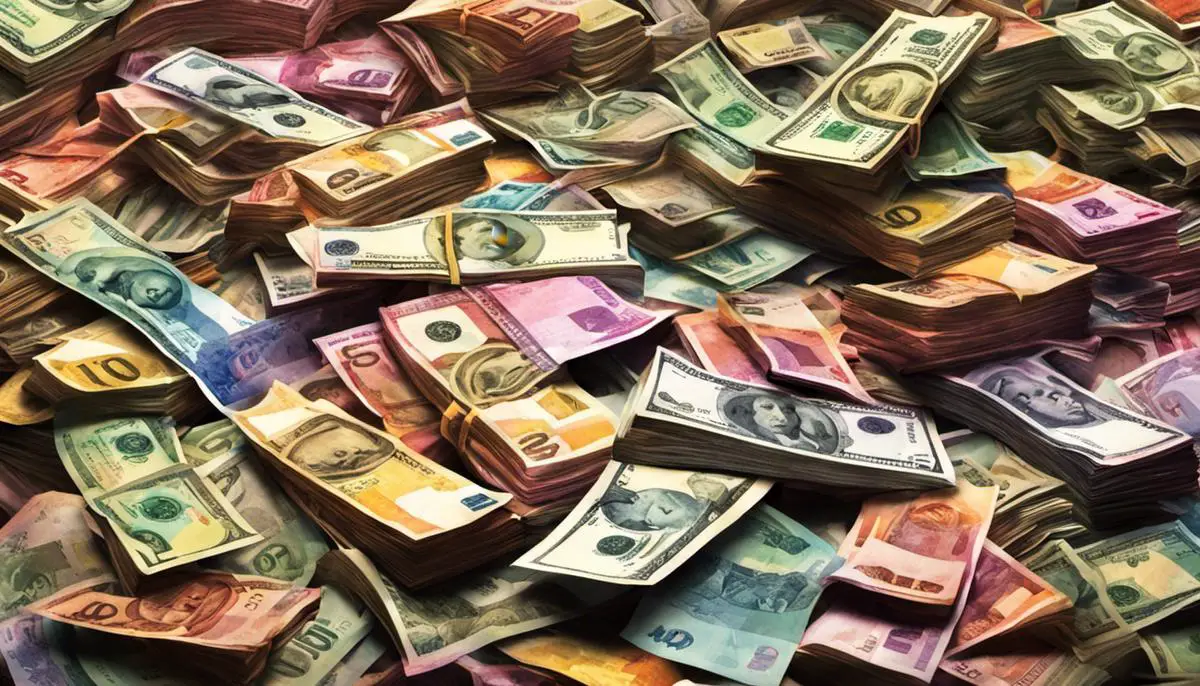Delving into the intricate world of dreams, which is tantalizingly positioned at the crossroad of reality and imagination, always makes for an intriguing exploration. Dreams about money notes, in particular, are a recurring motif for many individuals. The angels of our night-time musings, money notes seemingly plays a host of roles, ranging from the emblem of our aspirations and desires to the manifestation of our deepest anxieties and insecurities. This discourse will take you on a virtual tour down the entrancing lane of dreams about money notes. We’ll kick-start by examining the scientific underpinnings of dreams itself as a phenomenon, followed by an exploration of the symbolism that money holds within our unconscious selves according to psychology greats like Carl Jung and Sigmund Freud. But what triggers these ‘money dreams’? This brings us to the in-depth analysis of personal and societal experiences that shape these dreams. We will further probe into the divisive issue of dreams’ predictive power concerning financial conditions, and conclude with some practical approaches to decipher these nocturnal visions.
Understanding Dreams: An Overview
The Process and Purpose of Dreaming: Deciphering the Enigma of Human Consciousness
The realm of cognitive neuroscience has long been fascinated by the phenomenon of dreaming, a peculiar yet an integral component of the human experience. Despite its quotidian nature and universality across cultures and species, the process and purpose of dreaming remain shrouded in mystery, generating a considerable amount of speculation and research.
The process of dreaming primarily arises during the stage of rapid eye movement (REM) sleep, as established by early sleep research in the 1950s. The vivid, storyline-driven nocturnal dramas do not only unfurl during REM sleep, but also during the non-REM sleep stage. The key difference lies in the qualitative aspects of dreams experienced during these distinctive sleeping stages. REM-related dreams are typically characterized by a cinematic complexity, rendering them qualitatively different from the more mundane, thought-like ruminations typified by non-REM dreams.
Neurophysiologically, dreaming can be viewed as a complex interplay between varied regions of the brain. During waking hours, the prefrontal cortex—a region associated with executive functions such as planning and decision-making—serves as the chief executive officer of the brain. Conversely, during dreaming, the prefrontal cortex’s activity levels wane significantly, fostering a more decentralized state of cognition. Concurrently, the limbic system—an area crucial for emotion processing—ramps up its activity, resulting in a spectrum of emotions embedded within dreams.
Historically, considerable attention has been committed to resolving the enigma; what is the purpose of dreaming? Strides made in the investigation of this query concur that dreaming likely serves multiple purposes, not a singular function.
One such perspective draws on research from memory consolidation and learning. Dreaming, particularly during REM sleep, is suggested to aid the consolidation of learned experiences into memories, contributing to cognitive and emotional processing. This theory, known as the ‘continual-activation’ theory, posits that the process of dreaming is a by-product of the brain’s attempts to create associations and connections among recent experiences and memories.
Another theory proposes that dreams provide a virtual reality model of the world that is tested, explored, and updated—a form of offline cognitive rehearsal. Predicated on the concept of ‘threat simulation,’ it suggests that dreaming aids in the survival of an organism by simulating potential threats and mapping possible responses, improving problem-solving strategies in reality.
Finally, from a psychoanalytic perspective, dreams are viewed as expressions of repressed wishes and intrapsychic conflicts, serving to preserve sleep by deflecting disruptive anxieties into symbolic enactments.
The exploration into the nature and purpose of dreaming is a testament to the beauty and complexity of the human mind. Meticulous research endeavors continue to uncover fascinating insights, elegantly merging the oft-discordant worlds of science and poetics. Yet, for an arena so intimately interlaced with human existence, the scientific understanding of dreaming remains intriguingly incomplete. Thus, it serves as a beckoning invitation for future research, promising a riveting journey into comprehending this esoteric facet of consciousness.

Photo by morganhousel on Unsplash
Symbolism of Money in Dreams
The Symbolic Significance of Money in Dreams: An Intellectual Exploration
Shifting gears from the established understanding of dreams and their brain-related associations, let us delve into one of the most fascinating and complex aspects of dream interpretation: symbols. In several cultures and traditions, objects recurring in dreams warrant certain interpretations, with their implications often transcending the realm of the conscious. Among the myriad of dream symbols, money, particularly monetary notes, carries significant symbolism.
Money, as a concrete symbol in dreams, often transcends the literal interpretation of wealth and prosperity. It touches on a multitude of nuanced personal and psychological spheres, thereby necessitating an intricate evaluation. While Sigmund Freud, the marquee pioneer of psychoanalysis, proposed that every component of the dream represents a substitution for repressed desires, Carl Jung, another eminent psychoanalyst, argued for direct symbolic interpretations.
In the context of money, there’s a consensus among philosophers, psychologists, and dream interpreters that it often signifies self-worth and personal value, rather than material wealth. From this perspective, dreaming of discovering or acquiring money might suggest an unconscious realisation of Self-worth or hint at tapping into unexplored strengths or skills. This is consistent with the cognitive approach to dreams, where dreams serve as the contemplative canvas for covert self-evaluation and tentative discovery.
Conversely, losing money in dreams can indicate a fear of loss or change, anxiety over destabilisation of status quo, or a persistent feeling of insecurity or inadequacy. The existential dread associated with dreams of losing money resonates with Sartre’s philosophy of existentialism and Heidegger’s concept of ‘dasein.’ Both philosophers underscored the role of dread, loss, and abandonment in unveiling the naked truth of existence.
Money in dreams might also evoke feelings related to control, power, and freedom, especially given the societal correlation between wealth and agency. In this regard, the quantity and condition of notes in dreams can offer a deeper comprehension. Crisp, new bills could imply positivity, opportunities, or potential growth, while dirty or torn notes might symbolise missed chances, wasted efforts, or personal setbacks.
However, the symbolic interpretation of financial imagery in dreams is not a ‘one-size-fits-all’ proposition. The interpretation, with an appreciation for the subjective disposition, is vital. This hinges on personal contexts, past experiences, cultural influences, socio-economic backgrounds, presuppositions, and conscious attitudes towards money.
In conclusion, the symbol of money, in its various forms in dreams, helps decode intricate psychological concepts, veiled emotions, and subjective values. The multi-disciplinary perspective, which spans across cross-cultural anthro-psychology, psychoanalysis, cognitive psychology, existential philosophy, and phantasms, provides us with an abundant pool of interpretations and hypotheses. Nevertheless, given the opaqueness and the profound subjectivity intrinsic in dream interpretation, the fascinating quest for understanding the symbolic meaning of money, and other widespread symbols in dreams, will persist.

Photo by joshappel on Unsplash
Experiences Influencing ‘Money Dreams’
Shifting the focus towards the symbolic aspect, money, intriguingly, poses an enigmatic role within dreams. Its universal magnificence conjoins impeccably with the multilayered domain of dreams. Viewing it through the lenses of pioneers, Sigmund Freud and Carl Jung, leads to diverging interpretations; while Freud often associated it with sexual energy and power, for Jung, it depicted the central archetype of life energy.
Additionally, money’s symbolism extends to the profound concept of self-worth and personal value. To paraphrase, dreams involving the discovery or acquisition of money might be an unconscious realization of self-worth, an indication of unearthing untapped strengths or skills. These findings echo the Jungian philosophy where dreams serve as a reflection of the individuals’ subconscious mind, whether it be aspirations, fears, or even latent potentials.
Further venturing into the realm of darker emotions, one may encounter dreams of losing money. These dreams could hold implications of fear, change, anxiety, insecurity, or inadequacy. They might be conceived as existential dread, connecting further to philosophical theories of existentialism and Heidegger’s term ‘dasein’, implying being “thrown” into an absurd existence.
Interestingly, the representation of money in dreams editorializes control, power, and freedom. Such themes frequently reflect our subconscious desires to attain or maintain these aspects in our waking lives. Likewise, interpretation of the quantity or condition of money notes in dreams further unravels layers of subconscious messages. A substantial amount might signify a sense of personal accomplishment, whereas counterfeit or stained notes could mirror feelings of deceit or unworthiness.
Of paramount importance, however, is appreciating the role of personal context in dream interpretation. Past experiences, cultural influences, socio-economic backgrounds, presuppositions, and even conscious attitudes towards money significantly shape financial imagery’s interpretation in dreams. Therefore, objective views that fail to consider these diverse factors might offer incomplete or inaccurate interpretations.
In conclusion, the complex nature of dream symbology, such as money notes, amplifies the intricacy and subjectivity of dream interpretation. While thorough explorations have been undertaken, a comprehensive understanding remains elusive, fuelling the ongoing quest to decode the symbolic meaning of money and other widespread symbols in dreams. As in all scientific endeavors, it reminds us of the necessity for continuous research and the passion for unlocking the enigmatic mind’s secrets.

Money Dreams and Predictive Power
Money has often played an enigmatic role within dreams across diverse cultures and societies. It is a frequent recurring symbol that puts forward varied connotations and meanings. However, the relationship between dreaming of banknotes and its predictive qualities in reality has remained largely elusive.
In a quest to decipher the intricacies of dream symbolism, two pioneering figures in the realm of psychoanalysis, Sigmund Freud and Carl Jung, have offered diverging interpretations. Freud viewed money, especially coins, as inherently linked to Freudian concepts of libido and life energy. On the contrary, Jung perceived money as a symbol of psychic energy and potential that is available to the dreamer in waking life.
Money may be construed in dream analysis as a representation of self-worth and personal value, fabricating a complex nexus between the dreamer’s subjective reality and their socio-economic environment. Consequnetly, dreams of discovering or acquiring money could perhaps suggest an unconscious realization of self-worth.
Conversely, dreams of losing money can often leave an imprint of unease, echoing threads of fear, change, anxiety, and insecurity. They can unpack a deep-seated vulnerability, inadequacy, or a pervasive existential dread. This alludes to the deeply rooted philosophical theories of existence, pertaining to existentialism and Heidegger’s notion of ‘dasein’ – an existence that is inextricably woven with uncertainty.
Interpreting money in dreams as a symbol of control, power, and freedom extends beyond mere financial prosperity. It embodies an intricate matrix of relationships, emphasizing personal agency and capacity to navigate life’s challenges.
Furthermore, the quality and quantity of money in dreams might manifest unconscious insights related to one’s financial anxieties, aspirations, or repeated mundane experiences, such as counting banknotes or handling money transactions.
Interpreting such dynamic and polysemic symbols as money, however, requires an in-depth understanding of the dreamer’s personal context. Factors such as past experiences, cultural influences, socio-economic backgrounds, presuppositions, and conscious attitudes towards money add intricacy to the interpretation process.
In summary, it is crucial to approach the interpretation of financial imagery in dreams with caution. The complexity and subjectivity of dream interpretation compel us to recognize the unique and personalized nature of dreams. More than attempts to predict future events, dreams ultimately serve as mirrors reflecting our emotional landscapes and cognitive processes, imbibed with idiosyncratic imageries and symbols.
Thus, the ongoing quest for understanding the symbolic meaning of money and other widespread symbols in dreams leads to exciting revelations about our human psyche, nurturing a more comprehensive understanding of the dream and its elusive panoramic reality. While the science of dream interpretation is still nascent, such explorations can indeed enrich the tapestry of our comprehension about the mind’s nocturnal adventures.

Approaches to Interpret Money Dreams
Now that we have a grasp on the scientific understanding of dreaming, it’s time to delve into exploring the nature of symbolic elements frequently manifesting in dreams, primarily money notes.
Money, in its simplest form, is a societal tool to facilitate exchanges. However, its vast symbolism spans across self-worth, control, power, and freedom. Money notes in a dream, like any other symbols, stimulate various interpretations. The beloved godfathers of psychoanalysis, Sigmund Freud and Carl Jung, both saw symbols in dreams as pivotal platforms for unveiling a sleeper’s subconscious.
Freud’s school of thought endorsed the idea that dream symbols have a singular, primarily sexual symbolism; thus he may have associated money dreams with a yearning for power or control. On the other hand, Jung broke away from the strict Freudian interpretations and argued for a more individual, contextual approach to dream analysis. He postulated that each symbol’s meaning, including money, might differ significantly depending on personal experiences, associates, and cultural influences.
A dream about discovering or acquiring money might symbolize an unconscious realization of self-worth or the unveiling of unexplored strengths or skills. An individual embarking on a journey of self-discovery or personal growth may find their dreams populated with wealth and prosperity.
Contrastingly, dreams of losing money could reflect fears or anxieties surrounding change, insecurity, or inadequacy. These dreams could be infused with an existential dread, a reference to philosophical concepts of existentialism and ‘dasein’; the anxiety follows the awareness of one’s being as fleeting and temporary.
The environment in which money notes appear in dreams also holds substantial interpretive value. For instance, discovering money notes in a garden might indicate that the dreamer feels their hard work (the garden) will soon be rewarded (money), while a dilapidated money note might be interpreted as a sense of devaluation or fear of financial instability.
Interpretation of dreams always requires a thorough understanding of an individual’s past experiences, cultural influences, socio-economic backgrounds, presuppositions, and conscious attitudes towards money. What might symbolize success and prosperity for some could represent undue pressure and materialism for others. Hence, one should not dismiss the dreamer’s unique personal context while deciphering financial imagery in dreams.
The nature of dream interpretation, by its very existence, is complex and subjective. As we tread on an academic journey of dissecting dreams featuring money notes, we simultaneously unfurl a winding tapestry of emotional landscapes and cognitive processes.
It is imperative to remember that dream symbols like money notes are not concrete representations, but complex metaphors crafted by the unconscious mind to communicate with the conscious self. While unraveling these metaphors, being respectful of their complexity and subjectivity is crucial.
While Freud and Jung set the groundwork for dream symbolism, the academic quest towards pinpointing the exact meanings of symbols within dreams, such as money notes, continues to be elusive, challenging, and exhilarating. The ongoing exploration of the symbolic meaning of money and other universal symbols in dreams continues to ignite the academic realm, fueling the flame of fascination towards the realm of the unconscious mind. This intricate dance between the known and the unknown is the essence of the scientific and psychological study of dreams.

After delving deep into the complexities of monetary dreams, it becomes clear that our slumbering brain’s currency of imagery is rich with metaphorical insights. The symbolism of money, arising from our unique experiences and societal constructs, infuses our dreams with added layers of meaning. While the jury might still be out on the predictive power of monetary dreams, they undeniably offer us an intriguing glimpse into our unconscious selves. Lastly, the use of various scientific and traditional tools to interpret these dreams not only unravels these meanings further but also potentially offers valuable psychological benefits. So, the next time you find your dreams brimming with monetary notes, look beyond the surface flutter of the bills, perhaps the true wealth lies not in the notes flashed but in the messages they convey. Let the cryptic concert of the subconscious continue to play!
